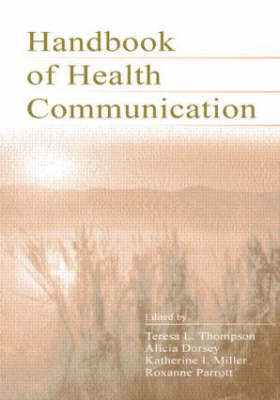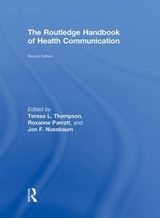
The Routledge Handbook of Health Communication
Lawrence Erlbaum Associates Inc (Verlag)
978-0-8058-3857-2 (ISBN)
- Titel erscheint in neuer Auflage
- Artikel merken
The Handbook of Health Communication brings together the current body of scholarly work in health communication. With its expansive scope, it offers an introduction for those new to this area, summarizes work for those already learned in the area, and suggests avenues for future research on the relationships between communicative processes and health/health care delivery.
The Handbook begins with a macro perspective on the contribution of theory to health communication. It then illuminates the scope of health communication around the contextual frameworks traditionally used in the discipline of communication. The contents are organized into six parts, which break out as follows:
*Part I: Introduction addresses some introductory theoretical and metatheoretical issues related to health communication.
*Part II: Provider-Patient Interaction Issues discusses such issues as communication skills training, outcomes of provider-patient interaction, disclosure issues, methods for studying provider-patient interaction, and special populations.
*Part III: Social and Community Health Issues emphasizes such issues as community organizing and health risk management, social support, everyday interpersonal communication and health, and marginalized populations.
*Part IV: Organizational Issues includes chapters on organizational forms, stress and social support, groups and teams in health care, organizational rhetoric, and working well.
*Part V: Media Issues offers chapters on health campaigns and communication design strategies, narrowcast health messages, telemedicine, health public relations and information in the media, and health literacy.
*Part VI: Lessons and Challenges From the Field focuses on lessons learned in the field, including important contributions by those who have worked to combine academic with policy/practitioner perspectives within the field of health communication, and concludes with a focus on ethics in health communication research.
With contributions from top scholars in health communication, public health, and related areas, this Handbook establishes a benchmark in current scholarship and research. The chapters included here provide definitive examinations of the various aspects of health communication, and encourage readers to delve further into these areas on their own through an examination of the representative citations. The Handbook of Health Communication is intended for students, researchers, and practitioners with interests in the various aspects of health communication, and it will serve as an essential resource and reference for all concerned with health communication issues.
Contents: Preface. T.L. Thompson, Introduction. Part I: Introduction. (Edited and With Introduction by K.I. Miller). B.F. Sharf, M.L. Vanderford, Illness Narratives and the Social Construction of Health. A.S. Babrow, M. Mattson, Theorizing About Health Communication. R.L. Street, Jr., Communication in Medical Encounters: An Ecological Perspective. Part II: Provider-Patient Interaction Issues (Edited and With Introduction by T.L. Thompson). D.J. Cegala, S.L. Broz, Provider and Patient Communication Skills Training. D. Roter, K.S. McNeilis, The Nature of the Therapeutic Relationship and the Assessment of Its Discourse in Routine Medical Visits. J.B. Brown, M. Stewart, B.L. Ryan, Outcomes of Patient-Provider Interaction. C.M. Gillotti, Medical Disclosure and Decision-Making: Excavating the Complexities of Physician-Patient Information Exchange. J.F. Nussbaum, S. Reagan, B. Whaley, Children, Older Adults, and Women: Impact on Provider-Patient Interaction. Part III: Social and Community Health Issues (Edited and With Introduction by A. Dorsey). J.W. Dearing, The State of the Art and the State of the Science of Community Organizing. C.W. Scherer, N.K. Juanillo, Jr., The Continuing Challenge of Community Health Risk Management and Communication. L.A. Ford, G.A. Yep, Working Along the Margins: Developing Community-Based Strategies for Communicating About Health With Marginalized Groups. T.L. Albrecht, D.J. Goldsmith, Social Support, Social Networks, and Health. R.J.W. Cline, Everyday Interpersonal Communication and Health. Part IV: Organizational Issues (Edited and With Introduction by K.I. Miller). J.C. Lammers, A.P. Duggan, J.B. Barbour, Organizational Forms and the Provision of Health Care. J. Apker, E.B. Ray, Stress and Social Support in Health Care Organizations. M.S. Poole, K. Real, Groups and Teams in Health Care: Communication and Effectiveness. C. Conrad, H.G. McIntush, Organizational Rhetoric and Healthcare Policymaking. P. Geist-Martin, K. Horsley, A. Farrell, Working Well: Communicating Individual and Collective Wellness Initiatives. Part V: Media Issues. (Edited and With Introduction by R. Parrott). C. Salmon, C. Atkins, Using Media Campaigns for Health Promotion. L. Murray-Johnson, K. Witte, Looking Toward the Future: Health Message Design Strategies. R.N. Rimal, A.D. Adkins, Using Computers to Narrowcast Health Messages: The Role of Audience Segmentation, Targeting, and Tailoring in Health Promotion. J.W. Turner, Telemedicine: Expanding Health Care Into Virtual Environments. J.K. Springston, R.A.W. Lariscy, Health as Profit: Public Relations in Health Communication. K.N. Kline, Popular Media and Health: Images, Effects, and Institutions. J.M. Bernhardt, K.A. Cameron, Accessing, Understanding, and Applying Health Communication Messages: The Challenge of Health Literacy. Part VI: Lessons and Challenges From the Field. (Edited and With Introduction by A. Dorsey). G.L. Kreps, Opportunities for Health Communication Scholarship to Shape Public Health Policy and Practice: Examples From the National Cancer Institute. T. Edgar, V. Freimuth, S.L. Hammond, Lessons Learned From the Field on Prevention and Health Campaigns. R. Parrott, C. Steiner, Lessons Learned About Academic and Public Health Collaborations in the Conduct of Community-Based Research. N. Guttman, Ethics in Health Communication Interventions.
| Erscheint lt. Verlag | 13.5.2003 |
|---|---|
| Reihe/Serie | Routledge Communication Series |
| Verlagsort | Mahwah |
| Sprache | englisch |
| Maße | 178 x 254 mm |
| Gewicht | 1497 g |
| Themenwelt | Studium ► Querschnittsbereiche ► Prävention / Gesundheitsförderung |
| ISBN-10 | 0-8058-3857-0 / 0805838570 |
| ISBN-13 | 978-0-8058-3857-2 / 9780805838572 |
| Zustand | Neuware |
| Informationen gemäß Produktsicherheitsverordnung (GPSR) | |
| Haben Sie eine Frage zum Produkt? |
aus dem Bereich



